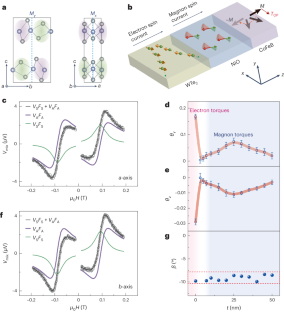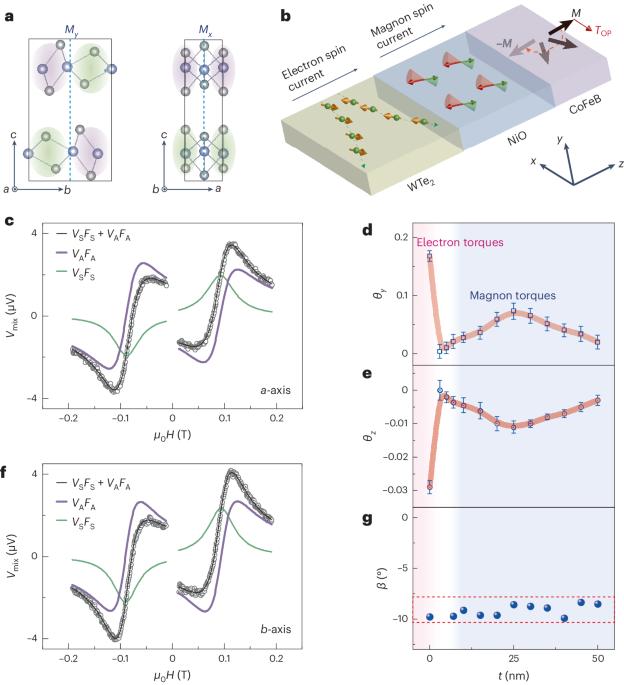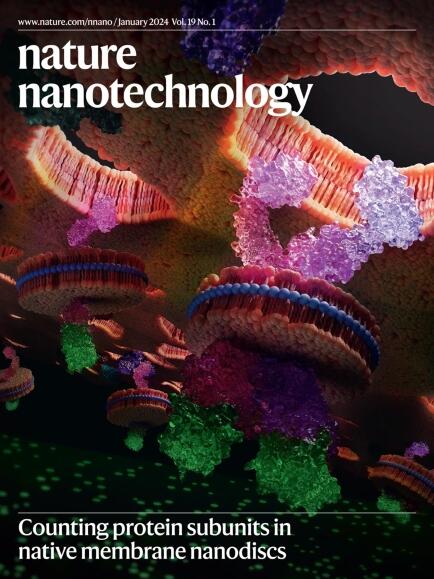Deterministic switching of perpendicular magnetization by out-of-plane anti-damping magnon torques
IF 38.1
1区 材料科学
Q1 MATERIALS SCIENCE, MULTIDISCIPLINARY
引用次数: 0
Abstract
Spin-wave excitations of magnetic moments (or magnons) can transport spin angular momentum in insulating magnetic materials. This property distinguishes magnonic devices from traditional electronics, where power consumption results from electrons’ movement. Recently, magnon torques have been used to switch perpendicular magnetization in the presence of an external magnetic field. Here we present a material system composed of WTe2/antiferromagnetic insulator NiO/ferromagnet CoFeB heterostructures that allows magnetic field-free switching of the perpendicular magnetization. The magnon currents, with a spin polarization canting of −8.5° relative to the sample plane, traverse the 25-nm-thick polycrystalline NiO layer while preserving their original polarization direction, subsequently exerting an out-of-plane anti-damping magnon torque on the ferromagnetic layer. Using this mechanism, we achieve a 190-fold reduction in power consumption in PtTe2/WTe2/NiO/CoFeB heterostructures compared to Bi2Te3/NiO/CoFeB control samples, which only exhibit in-plane magnon torques. Our field-free demonstration contributes to the realization of all-electric, low-power, perpendicular magnetization switching devices. Control of magnetization is at the core of many spintronic applications. Out-of-plane anti-damping magnon torque now enables low-power, deterministic switching of perpendicular magnetization at zero magnetic field.


通过平面外反阻尼磁子转矩实现垂直磁化的确定性切换。
磁矩(或磁子)的自旋波激发可在绝缘磁性材料中传输自旋角动量。这一特性使磁子设备有别于传统的电子设备,后者的功耗来自电子运动。最近,磁子力矩已被用于在外部磁场存在的情况下切换垂直磁化。在这里,我们介绍了一种由 WTe2/反铁磁绝缘体 NiO/铁磁体 CoFeB 异质结构组成的材料系统,它可以实现垂直磁化的无磁场切换。磁子电流相对于样品平面的自旋极化倾斜度为-8.5°,在保持其原始极化方向的同时穿过 25 纳米厚的多晶氧化镍层,随后在铁磁层上施加平面外抗阻尼磁子力矩。利用这种机制,我们实现了 PtTe2/WTe2/NiO/CoFeB 异质结构的功耗比 Bi2Te3/NiO/CoFeB 对照样品降低 190 倍,而 Bi2Te3/NiO/CoFeB 对照样品只表现出平面内的磁子力矩。我们的无磁场演示有助于实现全电、低功耗、垂直磁化开关器件。
本文章由计算机程序翻译,如有差异,请以英文原文为准。
求助全文
约1分钟内获得全文
求助全文
来源期刊

Nature nanotechnology
工程技术-材料科学:综合
CiteScore
59.70
自引率
0.80%
发文量
196
审稿时长
4-8 weeks
期刊介绍:
Nature Nanotechnology is a prestigious journal that publishes high-quality papers in various areas of nanoscience and nanotechnology. The journal focuses on the design, characterization, and production of structures, devices, and systems that manipulate and control materials at atomic, molecular, and macromolecular scales. It encompasses both bottom-up and top-down approaches, as well as their combinations.
Furthermore, Nature Nanotechnology fosters the exchange of ideas among researchers from diverse disciplines such as chemistry, physics, material science, biomedical research, engineering, and more. It promotes collaboration at the forefront of this multidisciplinary field. The journal covers a wide range of topics, from fundamental research in physics, chemistry, and biology, including computational work and simulations, to the development of innovative devices and technologies for various industrial sectors such as information technology, medicine, manufacturing, high-performance materials, energy, and environmental technologies. It includes coverage of organic, inorganic, and hybrid materials.
 求助内容:
求助内容: 应助结果提醒方式:
应助结果提醒方式:


